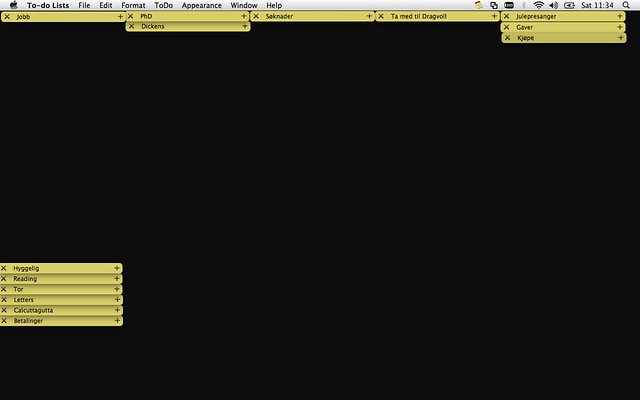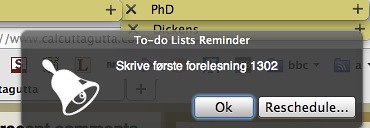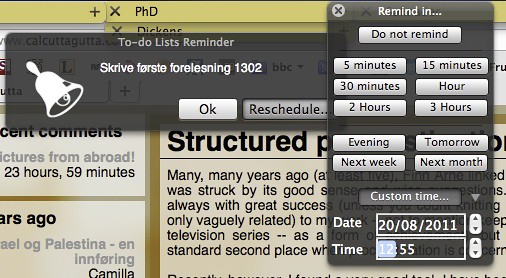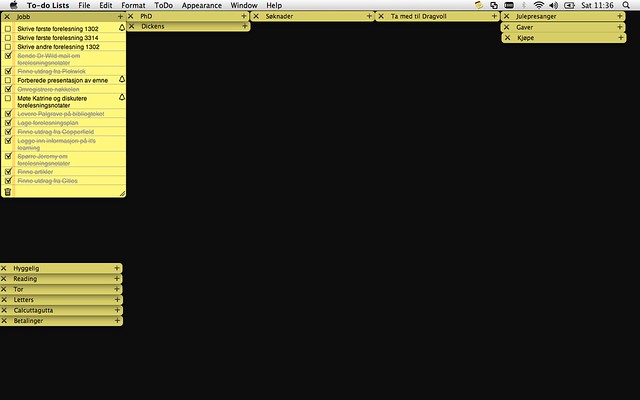
Many, many years ago (at least five), Finn Arne linked me to this essay on structured procrastination. I was struck by its good sense and wise suggestions. And I have been trying it out ever since. Not always with great success (unless you count knitting sweaters and reading books quite unrelated (or only vaguely related) to my work -- not to mention keeping up to date on geek culture and a selection of television series -- as a form of achievement), but certainly with a bad conscience (which is the standard second place when procrastination is concerned).
Recently, however, I found a very good tool. I have been well aware of the benefit of keeping to do-lists. The trouble is that they tend to either be on post-it notes or pieces of paper that I invariably lose, or expect to lose; and the other is that they frequently disappear from sight (and consequently mind) and therefore fail to remind me of the thing I need to do. This has not been a big problem in terms of getting things done, but only because I never quite relax and trust these notes. The downside to that, however, is a constant presence of low-level stress which is the perfect breeding ground for procrastination.
I have lately (over the last year or so) taken to using the ``Stickies'' application on my mac, and that worked quite well (because I would have a look at them whenever I was procrastinating, and therefore could do something sensible instead of something ... less so). However, the trouble with ``Stickies'' is that it provides no sense of accomplishment. There is a momentary reward in being able to delete an item from the list, but it does not last (because, once deleted, the item is gone). I missed the post-it/scraps of paper bonus of being able to see that I had ticked something off the list. I am a little like a 5-yearold like that: I want golden stars, even for having sent an e-mail.
And so I went to the App store and looked around for a Widget that I vaguely remembered, which would let you cross off items by ticking a little box (I love ticking little boxes). Instead I found something even better.
It cost me 7 nok (roughly 70p), and I am very happy with it. It is called, ``To Do-Lists'' (very nice name, I thought). I had looked at some more advanced ``time management apps'' as well, but they all seemed to provide more potential for procrastination than they seemed to help counter it.
This new program does exactly what it says on the tin: it allows you to make an unlimited (from what I can tell) number of lists, and then fill them with things you have to do; once you have done them, you can then tick them off the list, leaving them crossed out, and later delete both the entry and (if you choose) the list. It looks something like this (where with Writeroom in the background so as not to distract you from the matter at hand):

As you can probably tell from the sheer number of lists, I went a little overboard in the beginning, and I did (I must admit) use the list-making as a form of procrastination. But I soon ran out of things to add to the list, and the original thoroughness in making the lists has left me really rather relaxed. This is in part because I included a number of things that are pleasant and easy to do, and which I will have to do sooner or later, anyway (like knitting or buying gifts). But it is also because, unlike post-its and scraps of paper, this programme (or, application) tells me to do the most pressing things before I have to do them, thereby keeping me from having to keep track of everything in my head or constantly consult the list:


I do not have alarms on all entries, only the ones that I must remember to do at particular times or within the next couple of days.
And once I have done whatever it is I have to do, I tick the box and the entry is crossed out:
I have decided to clear the lists (certainly the work list and similar) every week-end, ready for a new start on Monday. That way, I can see, as the week progresses, that I have actually gotten things done.
That is a good feeling. And probably conducive to good mental health.